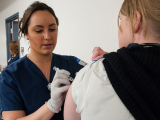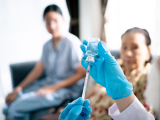Apr 6, 2007 (CIDRAP News) – New human cases of H5N1 avian influenza were reported in Cambodia and Egypt today, while Indonesian officials, according to one news service, said they would not resume sharing H5N1 virus samples unless vaccine manufacturers promise to provide the country with free pandemic flu vaccines.
Cambodia reported that a 13-year-old girl died of H5N1 infection yesterday, marking the country's seventh case and the first one this year, according to Agence France-Presse (AFP).
The girl was from Ponhea Kreak district in Kampong Cham province, which borders Vietnam, according to a report from the Chinese news service Xinhua. She became ill Apr 2 with a fever and diarrhea and was hospitalized the next day, the story said. Her case was confirmed by the Pasteur Institute of Cambodia in Phnom Penh.
In Egypt, the official news agency, MENA, reported today that a 2-year-old girl tested positive for H5N1 infection, according to an AFP report. The girl, from Minya governorate, south of Cairo, was hospitalized Apr 4 with a high fever, a health ministry spokesman said. She was treated with oseltamivir and was in stable condition, the story said.
The patient had been in contact with birds suspected of infection with H5N1, AFP reported.
In Indonesia, a 15-year-old girl whose H5N1 case was reported earlier died yesterday in Jakarta, according to AFP. The national avian flu information center said she was the 73rd Indonesian to die of the disease.
The World Health Organization (WHO) has recognized only 81 cases and 63 deaths in Indonesia. The agency stopped recording Indonesian cases after the country announced in early February that it had stopped sharing H5N1 virus samples with the WHO on the ground that drug companies were using them to make vaccines that poor countries couldn't afford. Since Jan 29, Indonesia has reported at least 11 cases that have not been registered by the WHO.
After a conference with the WHO and other Southeast Asian countries Mar 26 and 27, Indonesia promised to resume sharing samples immediately, while the WHO vowed to develop new guidelines for the sharing of virus samples. The rules were to be debated at the World Health Assembly in May, officials said.
Yesterday, Bloomberg News reported that Indonesian Health Minister Siti Fadilah Supari said the country would resume sharing samples "only after the WHO helps Indonesia negotiate free supplies of pandemic-flu shots and money to build vaccine plants." The requirement would be a first, the story said.
Indonesia is demanding compensation from drug manufacturers GlaxoSmithKline (GSK) and Novartis in particular, the story said. A GSK spokeswoman told Bloomberg that the company's chief executive, Jean-Pierre Garnier, would meet with WHO Director-General Margaret Chan today to discuss the dispute.
David Heymann, the WHO's assistant director-general for communicable diseases, said the new rules may require the WHO to disclose for the first time which companies use the viruses to make vaccines, according to Bloomberg. Heymann said the WHO would ask vaccine makers to provide free vaccine for use by poor countries.
The WHO will meet with Novartis, Sanofi-Aventis, and other drug companies Apr 25 to urge cooperation with the new rules.
Indonesia announced in February it had a tentative agreement with Baxter International, based in Deerfield, Ill., to share viruses in exchange for vaccine or help in building vaccine-making facilities. Triono Soendoro, head of flu research for the Indonesian health ministry, said the country is discussing similar deals with at least seven companies, the Bloomberg story said.
See also:
Mar 27 CIDRAP News story "WHO, Indonesia reach accord on virus sharing"


















